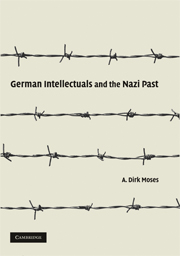Crossref Citations
This Book has been
cited by the following publications. This list is generated based on data provided by Crossref.
Carson, Cathryn
2010.
Science as instrumental reason: Heidegger, Habermas, Heisenberg.
Continental Philosophy Review,
Vol. 42,
Issue. 4,
p.
483.
von der Goltz, Anna
2011.
Generations of 68Ers.
Cultural and Social History,
Vol. 8,
Issue. 4,
p.
473.
Eley, Geoff
2011.
The Disentanglement of Populations.
p.
291.
Kallis, Aristotle
2012.
Landscapes of ‘Othering’ in Postwar and Contemporary Germany: The Limits of the ‘Culture of Contrition’ and the Poverty of the Mainstream.
Studies in Ethnicity and Nationalism,
Vol. 12,
Issue. 2,
p.
387.
2012.
Inhumanities.
p.
464.
Hosek, Jennifer Ruth
2012.
A Companion to German Cinema.
p.
155.
HAASE, CHRISTIAN
KRAIKER, CHRISTIAN
and
KREUZER, JÖRN
2012.
Germany's Foreign Relations and the Nazi Past.
Contemporary European History,
Vol. 21,
Issue. 1,
p.
79.
Fuchs, Anne
2012.
After the Dresden Bombing.
p.
150.
MOSES, A. DIRK
2012.
FORUM: INTELLECTUAL HISTORY IN AND OF THE FEDERAL REPUBLIC OF GERMANY.
Modern Intellectual History,
Vol. 9,
Issue. 3,
p.
625.
Scheuerman, William E
2013.
The realist revival in political philosophy, or: Why new is not always improved.
International Politics,
Vol. 50,
Issue. 6,
p.
798.
Herbst, Marcel
2014.
The Institution of Science and the Science of Institutions.
Vol. 302,
Issue. ,
p.
187.
Grossman, Jeffrey A.
2014.
Romanticism Rejected and Recovered: Heine and Germanistik in the Early Postwar Federal Republic of Germany.
Seminar: A Journal of Germanic Studies,
Vol. 50,
Issue. 3,
p.
353.
Taberner, Stuart
2014.
The Meaning of The Nazi Past in The Post-Postwar: Recent Fiction by Günter Grass, Christa Wolf and Martin Walser.
Seminar: A Journal of Germanic Studies,
Vol. 50,
Issue. 2,
p.
161.
Hoye, J. Matthew
and
Nienass, Benjamin
2014.
Authority without Foundations: Arendt and the Paradox of Postwar German Memory Politics.
The Review of Politics,
Vol. 76,
Issue. 3,
p.
415.
Ruff, Mark Edward
2014.
The Critical Reception of John Conway's The Nazi Persecution of the Churches, 1933-1945.
Kirchliche Zeitgeschichte,
Vol. 27,
Issue. 1,
p.
31.
Allwork, Larissa
2015.
Revisiting Holocaust Representation in the Post-Witness Era.
p.
288.
Bauerkämper, Arnd
2016.
German Philanthropy in Transatlantic Perspective.
p.
113.
Mercer, Ben
2016.
Specters of Fascism: The Rhetoric of Historical Analogy in 1968.
The Journal of Modern History,
Vol. 88,
Issue. 1,
p.
96.
Kansteiner, Wulf
2016.
Die Generation der Wendekinder.
p.
319.
Port, Andrew I.
2017.
Holocaust Scholarship and Politics in the Public Sphere: Reexamining the Causes, Consequences, and Controversy of theHistorikerstreitand the Goldhagen Debate.
Central European History,
Vol. 50,
Issue. 3,
p.
375.





